中职英语基础模块第二册精品资料
- 格式:doc
- 大小:73.50 KB
- 文档页数:13
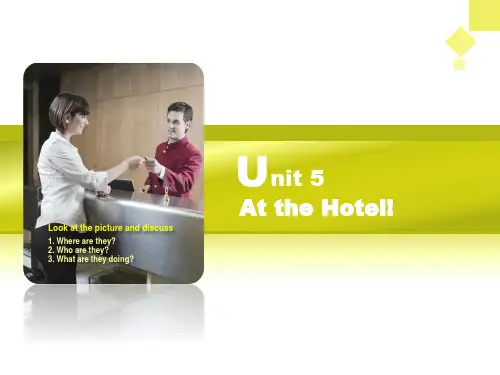

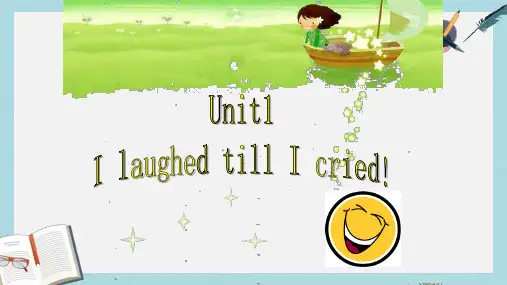
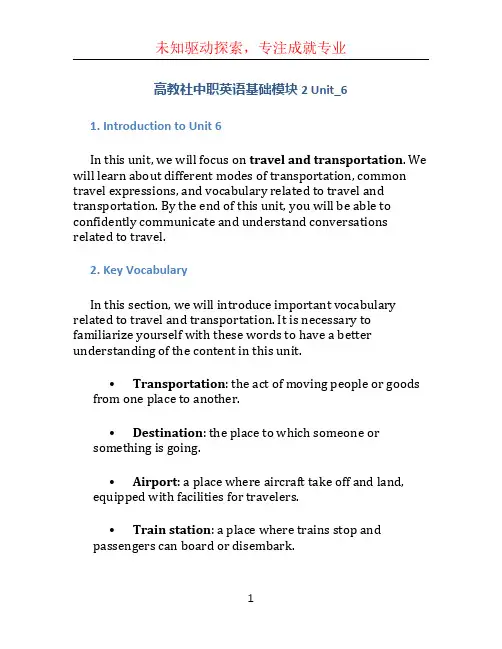
高教社中职英语基础模块2 Unit_61. Introduction to Unit 6In this unit, we will focus on travel and transportation. We will learn about different modes of transportation, common travel expressions, and vocabulary related to travel and transportation. By the end of this unit, you will be able to confidently communicate and understand conversations related to travel.2. Key VocabularyIn this section, we will introduce important vocabulary related to travel and transportation. It is necessary to familiarize yourself with these words to have a better understanding of the content in this unit.•Transportation: the act of moving people or goods from one place to another.•Destination: the place to which someone or something is going.•Airport: a place where aircraft take off and land, equipped with facilities for travelers.•Train station: a place where trains stop and passengers can board or disembark.•Bus stop: a designated place for buses to pick up or drop off passengers.•Taxi: a vehicle that carries passengers for a fare, usually driven by a professional driver.•Ferry: a boat or ship used to transport passengers and vehicles across a body of water.•Luggage: the bags and suitcases that a person takes when traveling.•Ticket: a piece of paper or electronic document serving as evidence that a fare has been paid.•Passport: an official document issued by the government that identifies a person as a citizen of aparticular country and allows them to travel internationally.•Boarding pass: a document that allows a passenger to board a plane or ship, usually obtained after checking in.3. Modes of TransportationThere are various modes of transportation available for travel. Let’s explore some of the most common ones:3.1 Air TravelAir travel is one of the fastest and most convenient modes of transportation for long-distance travel. It involves using an aircraft to reach your destination. Airports are equipped withvarious facilities for passengers, such as security checks, baggage claim areas, and boarding gates. When traveling by air, it is important to have your passport and boarding pass ready.3.2 Train TravelTrain travel is another popular mode of transportation, especially for medium to long-distance journeys. Train stations are designated places where trains stop, allowing passengers to board or disembark. Trains usually have different classes, such as first class and economy class, offering different levels of comfort and amenities.3.3 Bus TravelBuses are commonly used for both short and long-distance travel. Bus stops are designated places where buses pick up or drop off passengers. They are often more affordable compared to air or train travel and provide a convenient way to explore local destinations.3.4 TaxiTaxis are a common mode of transportation for short-distance travel within a city. They can be easily hailed on the street or found at designated taxi stands. Taxis usually charge a fare based on the distance traveled and may include additional charges for waiting time or tolls.3.5 FerryFerries are used for transportation across bodies of water, such as rivers or seas. They can carry passengers, vehicles, and even cargo. Ferries are commonly used for island hopping or crossing between continents.4. Common Travel ExpressionsWhen traveling, it is important to know and understand common travel expressions to communicate effectively. Here are a few examples:•Excuse me, where is the nearest bus stop?•How much is a taxi to the airport?•What time does the train to Shanghai depart?•Is there free Wi-Fi on this flight?•Can you recommend any good restaurants near the hotel?•Where can I buy a ticket for the ferry?5. ConclusionUnit 6 has provided an overview of travel and transportation, including key vocabulary, modes of transportation, and common travel expressions. By understanding and practicing the content covered in this unit,you will be well-prepared to communicate and navigate through various travel situations. Remember to refer back to this unit whenever you need to brush up on your travel and transportation knowledge. Happy travels!。
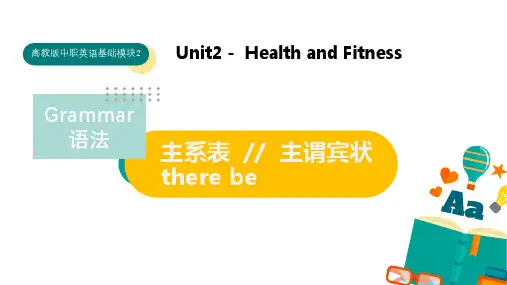
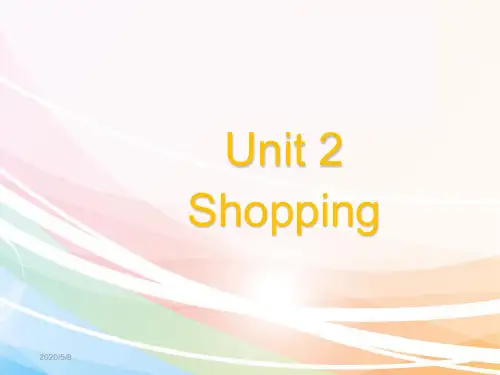

Unit 1 We laughed into tears!Parti 教材分析(Analysis of the teaching material)本课时系教材?英语2?(根底模块高教版)第一单元的第一局部,学生听一段关于和家人度假描述的对话.练习学生在一定的语境下用适宜的方式和语句组织关于描述假期活动的对话. Part2 教学目标(Teaching aims)Ss can understandexpressionof vacation description and make a dialogue discussing vacationLead-inAsk the students where did they go and what they did in the summer vacation and winter vacation. (Group discussion and then answer my questions)Step1Lead students read the phrases and ask Ss to tick the activitietshey had taken part in. then check the answer. Step2Teacher show the pictures for the Ss , explain the requests and then play the radio for theSs. Next, teacher asks some students to answer these questions.Listening & SpeakingParti 教材分析(Analysis of the teaching material)本课时系教材?英语2»(根底模块高教版)第一单元的听力及口语第一局部,学生听一段关于Cindy和家人度假描述的对话.练习学生在一定的语境下用适宜的方式和语句组织关于描述假期活动的对话.Part2教学目标(Teaching aims)Ss can understandexpressionof vacation description and make a dialogue discussingvacationVocabularySki Mountain sail parent beach skate vacation wonderfulPhrasesVisit the zoo go swimming pick apples go skiing climb mountain playvolleyball Go sailing go skating go fishingSentencesHow was your vacation?Where did you go?What was the weather like there?What did you do there?Did you enjoy yourselves?Part3教学重点(Teaching important pointsAsk and answer of the vacation descriptionPart4教学难点(Teaching difficult points)Different questions of vacation descriptionStep 1T shows the video about Hainan and then asks Ss what is the weather like in that place .Next, play the video for Ss.Step 2Ss listen and tick the city which Cindy and her family took a vacationSs listen again and answer the questions and match the persons with their activitiesStep 3Listen to the activity 6 and write the key sentences on the blackboard.How was your vacation?Where did you go?What was the weather like there?What did you do there?Did you enjoy yourselves?Ask the Ss to answer these questions and then T play the videos about skiing and skating. Especially explain the phrase ski resort:"Step 4T plays the videos about Kunming and Hainan, aiming to let the Ss to know these places.Ss make dialogues in pairs with given words and questions and talk about vacation Homework Review the expression of vacation descriptionPractice the dialogue of vacation descriptionFeedback学生关于旅游地点的表达有点出乎我的意料,上面这三个句子他们能够很熟练的完成,让我觉得一定要寓教于乐,在学习中欣赏生活.Reading &Writing (Unit Task)Parti 教材分析(Analysis of the teaching material)本课时系教材?英语2?(根底模块高教版)第一单元的阅读及写作局部,阅读关于两位读者Ben和Bob写给?家庭生活?的信.完成Bob' s mother和Ben's father的阅读题.帮助玛利向?家庭生活?投稿.Part2教学目标(Teaching aims)Ss can understand the pattern of lettersSs can find out the differences of two lettersVocabularyhousehold career daily return slip hesitation typical housewife chore volunteer hamPhraseshousehold duty daily run return to without hesitation typical housewife do housework volunteer to do start to count green peper SentencesShe went out for her daily run. When she returned to the house, she slipped and hit her head on the Driveway. My father volunteered to go to the supermarket for her. She gave him a shopping list with five items.Part3教学重点(Teaching important pointsThe pattern of letters and different description of family lifePart4教学难点(Teaching difficult points)Description of family lifeStep iT asks Ss if they received letters from their parents or friends. Then let' s read the following two letters from Bob and Ben sending to family life together.Step2Ss read the two letters written by two different writers. Ss may meet difficulties and they can raise their hands soT can help them. Given them 5minutes and finish activity 9 and activity 10T asks Ss to answer these questionsStep 3Ss translate the whole text and read together.Homework抄写单词每个三遍,明天默写;并将练习册上面的reading and writing写完FeedbackLanguage in useParti 教材分析(Analysis of the teaching material)TB本课时系教材?英语2?(根底模块高教版)第一单元的语法一般过去时,be动词、have和一般动词的肯定式、否认式和一般疑问式及肯定否认答复.Part2教学目标(Teaching aims)Ss can grasp the simple past tensePart3教学重点(Teaching important pointsSs grasp the affirmative form negative form and general question type with affirmative answer and negative answer of simple past tensePart4教学难点(Teaching difficult points)General question type with affirmative answer and negative answer of simple past tenseStep iExplain the affirmative form、negative form and general question type with affirmative answer and negative answer of simple past tense to SsStep 2Ss describe the pictures with given words and phrasesSs finish the dialogue with affirmative answer and negativeanswer to generalquestion type of simple past tenseHomeworkReview the simple past tenseFeedback语法是我们学生比拟薄弱的一项,课上的讲解重要,同时也需要学生课后的练习,学生对一般过去时的动词变形还是掌握的不够好.Vocabulary practiceParti 教材分析(Analysis of the teaching material)本课时系教材?英语2?(根底模块高教版)第一单元的词汇局部,通过语言在语境中的操练,稳固本单元重点词汇的使用.Part2教学目标(Teaching aims)Finish Vocabulary practicePhrasesa lot of fun a long holiday a terrible time puter games with my friendsPart3教学重点(Teaching important pointsGrasp using of the phrases in this unitPart4教学难点(Teaching difficult points)Usage of verbsStep 1Ss match the sentences which have logic relation Step 2Ss form verbal phrases with given words and phrases Step 3Consolidation & Check词组互译:去游泳 打排球去滑冰 去划船 自愿做有趣的故事career woman green pepper do houseworkstart to counta terrible time Homework抄写并背诵单词3遍Feedback电商143班学生英语根底稍好,单词默写也比拟理想,而两一个班级学生单词默 写反映不理想,还需要继续抓. 去滑雪 去航行去钓鱼 回到 购物清单household duty a trip to Shanghai without hesitation climbmountain。
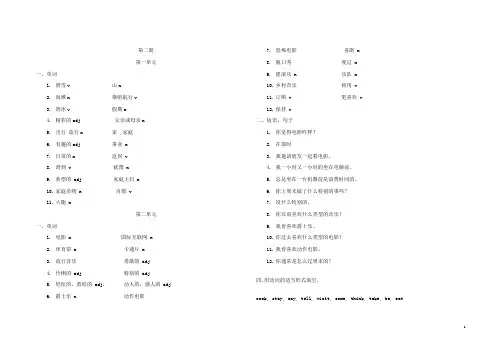
第二册第一单元一、单词1.滑雪v 山n2.海滩n 乘帆航行v3.滑冰v 假期n4.精彩的adj 父亲或母亲n5.出行旅行n 家 ,家庭6.有趣的adj 事业 n7.日常的n 返回 v8.滑到 v 犹豫 n9.典型的 adj 家庭主妇 n10.家庭杂物 n 自愿 v11.火腿 n第二单元一、单词1.电影 n 国际互联网 n2.体育馆 n 卡通片 n3.流行音乐勇敢的 adj4.伶俐的 adj 特别的 adj5.轻松的,放松的 adj. 动人的,感人的 adj6.爵士乐 n 动作电影7.恐怖电影喜剧 n8.脱口秀度过 n9.摇滚乐 n 乐队 n10.乡村音乐租用 v11.订购 v 更喜欢 v12.保持 v二、短语,句子1.你觉得电影咋样?2.在那时3.我邀请朋友一起看电影。
4.我一小时又一小时的坐在电脑前。
5.总是坐在一台机器前是浪费时间的。
6.你上周末做了什么特别的事吗?7.没什么特别的。
8.你以前喜欢什么类型的音乐?9.我曾喜欢爵士乐。
10.你过去喜欢什么类型的电影?11.我曾喜欢动作电影。
12.你通常是怎么过周末的?四.用动词的适当形式填空.cook, stay, say, tell, visit, come, think, take, be, eatLast Sunday it was snowy. Maria 1 at home. Her cousin Cara 2 to visit her. She came back from Beijing. She 3 Maria something about her vacation."It was pretty good," she said. Cara 4 the Palace Museum and the Great Wall. She 5 a lot of photos.It was lunch time. Maria's parents 6 not at home. They decided to cook by themselves. Maria 7 noodles with some tomatoes and pepper (辣椒). After Cara 8 up the noodles, she said slowly, “I think it is delicious!”But Maria 9 the food was too bad. She 10 ,“Cara, thank you, but I put too much pepper into it.第三单元一、单词1.有创造力的 adj 友好的,直爽的 adj2.自信的 adj 助手 n3.打字员 n 出纳员 n4.幼儿园 n 面试 n&v5.销售,经销 n 毕业 v6.交流 n 流利的 adj7.申请人 n 更有资格;更胜任 v8.张贴 v 广告,公告 n9.简历 n 尽早,尽快10.空闲时间 n 集体自由讨论 v二、短语,句子1.能介绍一下自己吗?2.我在一年公司兼职销售员两年了。
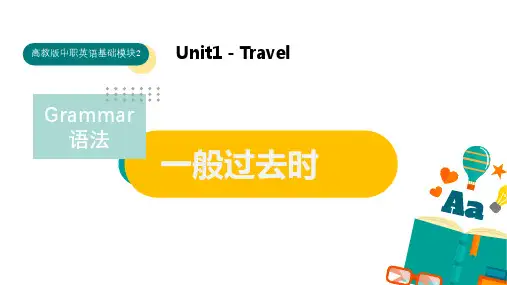
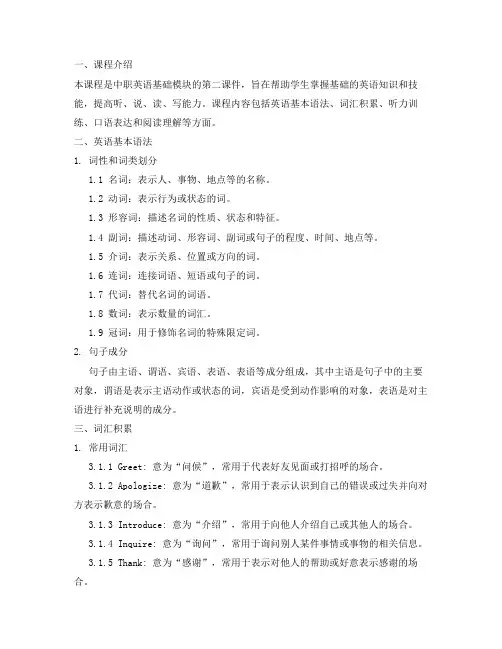
一、课程介绍本课程是中职英语基础模块的第二课件,旨在帮助学生掌握基础的英语知识和技能,提高听、说、读、写能力。
课程内容包括英语基本语法、词汇积累、听力训练、口语表达和阅读理解等方面。
二、英语基本语法1. 词性和词类划分1.1 名词:表示人、事物、地点等的名称。
1.2 动词:表示行为或状态的词。
1.3 形容词:描述名词的性质、状态和特征。
1.4 副词:描述动词、形容词、副词或句子的程度、时间、地点等。
1.5 介词:表示关系、位置或方向的词。
1.6 连词:连接词语、短语或句子的词。
1.7 代词:替代名词的词语。
1.8 数词:表示数量的词汇。
1.9 冠词:用于修饰名词的特殊限定词。
2. 句子成分句子由主语、谓语、宾语、表语、表语等成分组成,其中主语是句子中的主要对象,谓语是表示主语动作或状态的词,宾语是受到动作影响的对象,表语是对主语进行补充说明的成分。
三、词汇积累1. 常用词汇3.1.1 Greet: 意为“问候”,常用于代表好友见面或打招呼的场合。
3.1.2 Apologize: 意为“道歉”,常用于表示认识到自己的错误或过失并向对方表示歉意的场合。
3.1.3 Introduce: 意为“介绍”,常用于向他人介绍自己或其他人的场合。
3.1.4 Inquire: 意为“询问”,常用于询问别人某件事情或事物的相关信息。
3.1.5 Thank: 意为“感谢”,常用于表示对他人的帮助或好意表示感谢的场合。
2. 词汇用法3.2.1 Speak: 表达说话的行为,其过去式为spoke,过去分词为spoken。
3.2.2 Learn: 学习,其过去式为learned或learnt,过去分词为learned或learnt。
四、听力训练听力训练是提高听力理解能力的重要环节,能够帮助学生更好地理解和掌握英语口语表达。
五、口语表达口语表达是将所学的英语知识运用到实际口语交流中的能力。
通过对话、问答和情景模拟等练习,学生可以提高自己的口语表达能力和流利度。

高教版中职英语基础模块第2册Un...So much to do before we travel! 说课稿Ladies and gentlemen,It's really my pleasure to share my teaching idea with you. T o make my presentation much clearer, I'd like to divide it into 4 parts: about the lesson, about the students, about me and about my plan.Part I. About the lessonFirst, let me tell you something about the lesson briefly. It is the listening and speaking part of unit 7, book2. The whole class will last for 45 minutes. This lesson is mainly about travel plans. The topic is closely related with our daily life. Therefore, one function of this lesson is to combine English learning with the daily affair travelling. The other function is to improve Ss' listening and speaking skills.Part II. About the studentsThere is no doubt that we make the teaching design according to the specific conditions of the students. So next, I will introduce something about the ss. The lesson is designed for the students majoring in travelling from Grade One . They lack vocabulary, show low interest in English learing. Therefore they feel shy to speak in English. Furthermore, they feel anxious during the classroom activities. But because of their major, the Ss are curious about the topic and want to know more, hard-working and want to learn more. Easy learning tasks are welcome as well as happy classroom atmosphere. Of course, more encouragement and guidance should be offered.Part III. About meAnyway, it's time to say something about me. There are totally3 aspects. My aims, difficulties and methods together with aids.Aspect1. My aimsI will start from my aims in this lesson. I set the following teaching aims. First. Knowledge aims, during the class, I will help the Ss learn more words, phrases, and sentence patterns. Second, Ability aims, the Ss will be able to understand the listening materials and carry out conversations on the topic. As to the affection aims, I will try to make the Ss realize the importance of a travel plan. And through various activities, I also try to arouse their consciousness of cooperation and competition.Aspect2. My difficultiesHowever, it's always a challenge to fulfill the above aims. Here comes my difficulties. I often ask myself: How to enable the Ss to finish the basic learning task ? How to irritate them to join in the classroom activities? And how to lead them to use what they have learned?Aspect3. My methods& aidsIn order to reach the aims and solve the difficulties, task-based teaching method, situational teaching method , and pleasure teaching method will be used in my class. That is to say, I will give the Ss learning tasks as well as the vivid situations and exciting atmosphere. Multi-media technology will help a lot to achieve it. As you know, teaching today is not " a chalk, or a blackboard" any more. The multi-media teaching brings various elements into the classroom, such as pictures, sounds, videos, flash and so on. In my class, I will take full advantage of it to make my class more interesting and colorful.Part IV. About my planThe last and also the main part of my presentation is my teaching plan. I will show it for you right now. It includes 3 aspects: teaching procedures, blackboard design and teaching reflection. Aspect1. Teaching proceduresPlease allow me to focus on the teaching procedures first. It is made up of 4steps: warm-up& lead-in, listening, speaking and homework.Step1 warm-up& lead-inBefore the class, I will divide the Ss into 8 groups and declare that there will be a competition through the whole class. The Ss will be encouraged to cooperate with members and earn points for their own groups. To create an active atmosphere, I set a flash game called lucky flower for the Ss to warm up. The multi-media technology makes it possible to change the traditional class into the one which is full of images and sounds. The flash is helpful to give the students a real and vivid situation and involves the Ss easily and quickly. When the game finished, a short discussion will be carried out. The Ss will be asked to choose 3 most important things they need to do for the trip. It's a good chance to lead in to the lesson-----so much to do before we travel! We'd better make a travel plan! A series of questions will be listed: where do we often go for a travel? What to take with us? And what activities do we do?Step2 listeningTo understand the listening materials better, necessary words and phrases should be prepared. So I design two activities in the pre-listening part. The first activity is called" Best Memory". A competition will be held among groups. A short video will be showed. To be more closed to the topic, the video is made bymyself on purpose. With the video, I don't have to carry so many items to the classroom and it is more interesting to see a student act than the others. The students will be interested in this competition. They will try their best to write down the items which Bob has packed. Each word will earn one point. Then the answers will be checked to help the Ss to know more words. So far, the Ss has realized that before the travel we should pack some useful items, but that is not enough. A short brainstorm will be designed here. Pictures of different places for travel will be showed as well as a list of new words such as cash, bathing suit. The Ss will be asked to choose certain things according to different places and tell why. Therefore, the Ss will get to know there are 3 important points in a travel plan: the place to go, the things to take, and the activities to do.。
中职英语基础模块第二册第二册第一单元一、单词1.滑雪v 山n2.海滩n 乘帆航行v3.滑冰v 假期n4.精彩的adj 父亲或母亲n5.出行旅行n 家 ,家庭6.有趣的adj 事业 n7.日常的n 返回 v8.滑到 v 犹豫 n9.典型的 adj 家庭主妇 n10.家庭杂物 n 自愿 v11.火腿 n第二单元一、单词1.电影 n 国际互联网 n2.体育馆 n 卡通片 n3.流行音乐勇敢的 adj4.伶俐的 adj 特别的 adj5.轻松的,放松的 adj. 动人的,感人的 adj6.爵士乐 n 动作电影7.恐怖电影喜剧 n8.脱口秀度过 n9.摇滚乐 n 乐队 n10.乡村音乐租用 v11.订购 v 更喜欢 v12.保持 v二、短语,句子1.你觉得电影咋样?2.在那时3.我邀请朋友一起看电影。
4.我一小时又一小时的坐在电脑前。
5.总是坐在一台机器前是浪费时间的。
仅供学习与交流,如有侵权请联系网站删除谢谢26.你上周末做了什么特别的事吗?7.没什么特别的。
8.你以前喜欢什么类型的音乐?9.我曾喜欢爵士乐。
10.你过去喜欢什么类型的电影?11.我曾喜欢动作电影。
12.你通常是怎么过周末的?四.用动词的适当形式填空.cook, stay, say, tell, visit, come, think, take, be, eatLast Sunday it was snowy. Maria 1 at home. Her cousin Cara 2to visit her. She came back from Beijing. She 3 Maria something about her vacation."It was pretty good," she said. Cara 4 the Palace Museum and the Great Wall. She 5 a lot of photos.It was lunch time. Maria's parents 6 not at home. They decided to cook by themselves. Maria 7 noodles with some tomatoes and pepper (辣椒). After Cara 8 up the noodles, she said slowly, “I think it is delicious!”But Maria 9 the food was too bad. She 10,“Cara, thank you, but I put too much pepper into it.第三单元一、单词1.有创造力的 adj 友好的,直爽的 adj2.自信的 adj 助手 n3.打字员 n 出纳员 n4.幼儿园 n 面试 n&v5.销售,经销 n 毕业 v6.交流 n 流利的 adj7.申请人 n 更有资格;更胜任 v8.张贴 v 广告,公告 n9.简历 n 尽早,尽快10.空闲时间 n 集体自由讨论 v二、短语,句子1.能介绍一下自己吗?仅供学习与交流,如有侵权请联系网站删除谢谢32.我在一年公司兼职销售员两年了。
3.你的优势是什么?4.我今天参加了一个面试。
5.到目前为止,我已经向六家公司递交了应聘申请。
6.在这个领域你有工作经验吗?7.你认为自己能胜任这份工作吗?8.我们在寻找兼职英语老师。
9.我在家很忙,很久没和外界联系了。
10.我试着去他办公室找他,但是他不在。
三、用所给的动词的正确形式填空:1. The boy __________________ (draw) a picture now.2. Listen .Some girls __________( sing)in the classroom .3. My mother ____________ (cook) some nice food now.4. What _____ you ______ (do) now?5. Look. They _____________( have) an English lesson .6. They ____________(not ,water) the flowers now.7. Look! The girls ____________(dance )in the classroom .8. What is our granddaughter doing? She _________(listen ) to music.9. Its 5 o'clock now. We ___________(have)supper now 10.______Helen__________(wash )clothes? Yes, she is第四单元一、单词1.交通 n 轻轨2.渡船 n 方法,手段 n3.意思 n 意义 n4.有意义的 adj 用,依靠5.安逸的,使人舒适的 adj 风景 n6.场景 n 方便的 adj7.方便,便利 n 博客 n8.陌生的,奇怪的 adj 交通堵塞9.高峰时间工作场所 n10.合伙用车 n 分配;给予 v11.贷款 n 交通工具,车辆 n12.车费 n 讲价;谈判 v13.通道;入口 n二、短语,句子仅供学习与交流,如有侵权请联系网站删除谢谢41.我刚从北京回来。
2.在火车上,我欣赏沿途的美景。
3.北京的交通如何?4.你是否曾错过了最后一趟回家的火车或者公交车?5.你骑过马吗?骑过摩托车吗?6.你做过几次飞机?7.你最常使用哪种交通方式?8.那里交通很便利。
9.自从我最后一次去北京已经十年了。
10.我对乏味的工作厌倦了。
11.哪里的交通便利了很多。
12.我尝试了所有的交通工具。
13.你可以和我共用一把伞。
14.我有一些小建议给你。
三.填空题1.Mr. Zheng _______________ (read) a book now.2. The rabbits _________________ (jump) now.3.. Look ! Tom and John ________________ (swim).4. My brother _________________ (make) a kite in his room now.5. Look! The bus _______________ (stop).6. We _______________ (have) an English class now.7. Listen! Someone is__________________(come).8. They ___________________(catch) butterflies now.9. He ______________________ (do) an experiment now.10. They _____________________(collect) stamps now.第五单元一、单词1.(脸色或肤色)苍白的 adj 放松,休闲 v2.热衷的,对…着迷的 adj 苗条的 adj3.故意略去,跳过 v 重量,体重 n4.教练 n 向…提出建议,提出忠告v5.慢跑 v 日常饮食;节食二、短语;句子1.对…热衷的,喜好…熬夜2.增加体重减轻体重3.在压力下去除仅供学习与交流,如有侵权请联系网站删除谢谢54.不再节食5.你这个周末想要去干什么?6.我更愿意呆在家里。
7.我认为你应该多做户外运动。
8.我宁愿呆在家里,我喜欢读英文小说。
9.我通常不吃早饭而且熬夜。
10.我还是超重了。
11.我决定加入健身俱乐部。
12.教练建议我应该睡眠充足,而且多做运动。
13.我听了他的建议。
14.我过去常常早起。
15.我习惯早起。
16.两年前我找了份更好的工作。
17.我开始开车上班。
18.工作使我压力很大。
19.现在,我不再吸烟了。
20.我想去划船。
21.我喜欢打篮球。
22.我迷恋绘画。
23.我是一个音乐迷。
24.我特别喜欢足球。
25.我希望明年我变得更健康。
26.教练说我应该改掉坏习惯。
第六单元一、单词1.胃痛 n 牙疼 n2.疼痛的 adj 头疼 n3.感冒 n 发烧 n4.咳嗽 n&v 约定;预约 n5.疼痛;受伤 n&v 运动 n&v6.药片 n 症状 n7.体温;温度 n 诊所 n8.各种各样的 adj 沮丧的;不安的 adj9.诊断 v仅供学习与交流,如有侵权请联系网站删除谢谢610.易怒的;急躁的二、短语;句子1.感冒血压2.身体健康开玩笑3.金医生今天下午两点有空。
4.我想预约医生。
5.今天上午十点医生有空。
6.十点钟可以吗?7.你出现这样的症状多久了?8.多么丰盛的午餐!9.记住多做运动。
10.她看起来脸色苍白,而且不停地咳嗽。
11.这些药每天3次,服用三天。
12.卧床一周。
三、用合适的连接词填空。
1. Jim told me ____ he didn't go fishing yesterday afternoon.(how, why)2. Do you know ______ else is going to be on duty today?(who, whom)3. She said _____ it wouldn't matter much.(that, if)4. He always thinks ______ he can do better.(how, who)5. I really don't know ________ the bridge will be finished.(how long, how soon)6. They don't know _______ to go or wait. (if, whether)7. We are talking about ______ we’ll go back tomorrow. (whether,if)8. I was really surprised at ______ I saw. (where, what)9. I don't know ____ so many people are looking at him. (how, why)10. Do you know ______ you are studying for? (why, what)四、句型转换1. “Do you want to try it?” Tom's mother asked him.(同义句)→Tom's mother asked him _____ ____ ____ to try it.2. I think this is a good idea.(改为否定句)→ I _______ ________ this ________ a good idea.3. Lucy hasn't decided which trousers to buy.(改为复合句)仅供学习与交流,如有侵权请联系网站删除谢谢7→Lucy hasn't decided _____ ______ ______ _______ buy.4. I don't know how I can get to the hospital.(改为简单句)→I don't know ____ ______ _______ to the hospital.5. I don’t suppose they will come, _______ ______ ? (改为反意疑问句)五、用所给动词的正确形式填空。